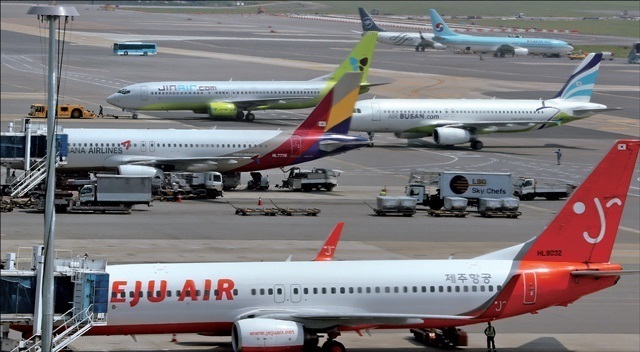All S. Korean airlines except Korean Air post Q1 operating losses for first quarter
Korean Air posts operating profit but budget airlines hit hard by prolonged pandemic
By Yim Hyun-suPublished : May 18, 2021 - 14:58

All South Korean airlines except Korean Air suffered operating losses during the first quarter of this year, as the coronavirus pandemic, which dealt a particularly severe blow to budget airlines, shows no sign of stopping soon.
Asiana Airlines posted an operating loss of 11.2 billion won ($10 million) and a net loss of 230.4 billion won on Monday, though the losses narrowed compared to the same time a year ago.
The country’s second-largest airline saw its revenue drop by 30.6 percent compared to the previous year, cargo sales increased 83 percent on the back of growing cargo demand in Southeast Asia, the United States and Europe.
“As the global vaccine rollout speeds up and travel restrictions ease, air travel demand is expected to recover and we will make an all-out effort to be prepared,” one official at the airline said.
Even worse figures hit budget airlines in the absence of cargo businesses that helped make Korean Air the only South Korean airline to post a profit for the first quarter, delivering a revenue of 1.7 trillion won and an operating profit of 124.5 billion won.
Jeju Air, a low cost carrier and the third largest airline in the country, saw its Q1 operating loss grow to 87.3 billion won, up 32.8 percent from one year ago, according to a regulatory filing posted on Monday.
Its revenue was down 81.8 percent to 41.8 billion won while its net loss decreased from 101.4 billion won to 79.3 billion won over the same period.
One industry source said the prolonged coronavirus has hit low-cost carriers harder.
“While full service carriers have managed to avoid big losses thanks to their cargo businesses, low cost carriers have few options to improve their performance,” the source said.
“The situation is likely to remain unchanged until the end of this year. Until the vaccine rollout is in full swing and air travel demand recovers, airlines can only rely on cargo businesses.”
T’way Air was hit with an operating loss of 45.4 billion won, nearly double the loss it suffered one year ago.
Jin Air, a budget airline owned by Korean Air’s parent company Hanjin Group, also saw its Q1 operating loss double from a year earlier, from 31 billion won to 60 billion won. Its revenue suffered a near 70 percent year-on-year drop from 143 billion to 43.9 billion won.
Air Busan, one of Asiana Airline’s two sister budget airlines, posted an operating loss of 47.2 billion won, joining the downward trend in the budget airline industry.
By Yim Hyun-su (hyunsu@heraldcorp.com)
Asiana Airlines posted an operating loss of 11.2 billion won ($10 million) and a net loss of 230.4 billion won on Monday, though the losses narrowed compared to the same time a year ago.
The country’s second-largest airline saw its revenue drop by 30.6 percent compared to the previous year, cargo sales increased 83 percent on the back of growing cargo demand in Southeast Asia, the United States and Europe.
“As the global vaccine rollout speeds up and travel restrictions ease, air travel demand is expected to recover and we will make an all-out effort to be prepared,” one official at the airline said.
Even worse figures hit budget airlines in the absence of cargo businesses that helped make Korean Air the only South Korean airline to post a profit for the first quarter, delivering a revenue of 1.7 trillion won and an operating profit of 124.5 billion won.
Jeju Air, a low cost carrier and the third largest airline in the country, saw its Q1 operating loss grow to 87.3 billion won, up 32.8 percent from one year ago, according to a regulatory filing posted on Monday.
Its revenue was down 81.8 percent to 41.8 billion won while its net loss decreased from 101.4 billion won to 79.3 billion won over the same period.
One industry source said the prolonged coronavirus has hit low-cost carriers harder.
“While full service carriers have managed to avoid big losses thanks to their cargo businesses, low cost carriers have few options to improve their performance,” the source said.
“The situation is likely to remain unchanged until the end of this year. Until the vaccine rollout is in full swing and air travel demand recovers, airlines can only rely on cargo businesses.”
T’way Air was hit with an operating loss of 45.4 billion won, nearly double the loss it suffered one year ago.
Jin Air, a budget airline owned by Korean Air’s parent company Hanjin Group, also saw its Q1 operating loss double from a year earlier, from 31 billion won to 60 billion won. Its revenue suffered a near 70 percent year-on-year drop from 143 billion to 43.9 billion won.
Air Busan, one of Asiana Airline’s two sister budget airlines, posted an operating loss of 47.2 billion won, joining the downward trend in the budget airline industry.
By Yim Hyun-su (hyunsu@heraldcorp.com)


![[Exclusive] Korean military set to ban iPhones over 'security' concerns](http://res.heraldm.com/phpwas/restmb_idxmake.php?idx=644&simg=/content/image/2024/04/23/20240423050599_0.jpg&u=20240423183955)

![[Graphic News] 77% of young Koreans still financially dependent](http://res.heraldm.com/phpwas/restmb_idxmake.php?idx=644&simg=/content/image/2024/04/22/20240422050762_0.gif&u=)



![[Pressure points] Leggings in public: Fashion statement or social faux pas?](http://res.heraldm.com/phpwas/restmb_idxmake.php?idx=644&simg=/content/image/2024/04/23/20240423050669_0.jpg&u=)









